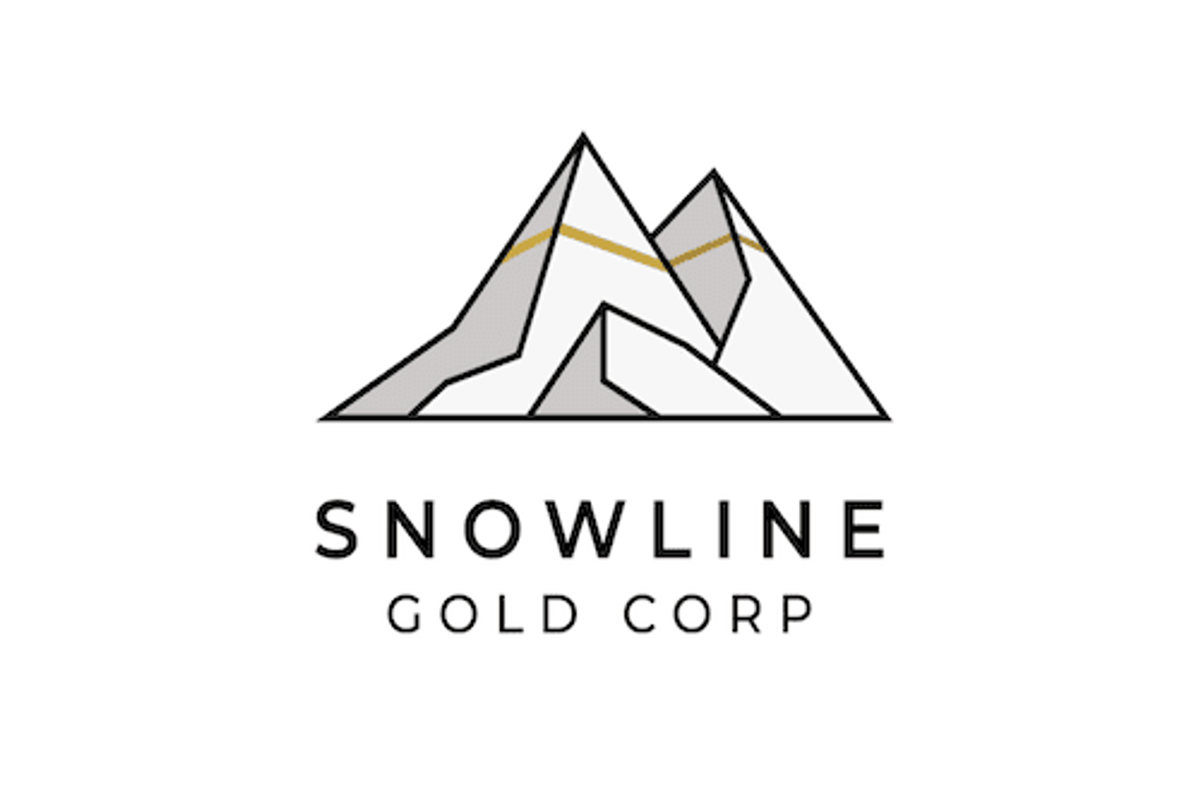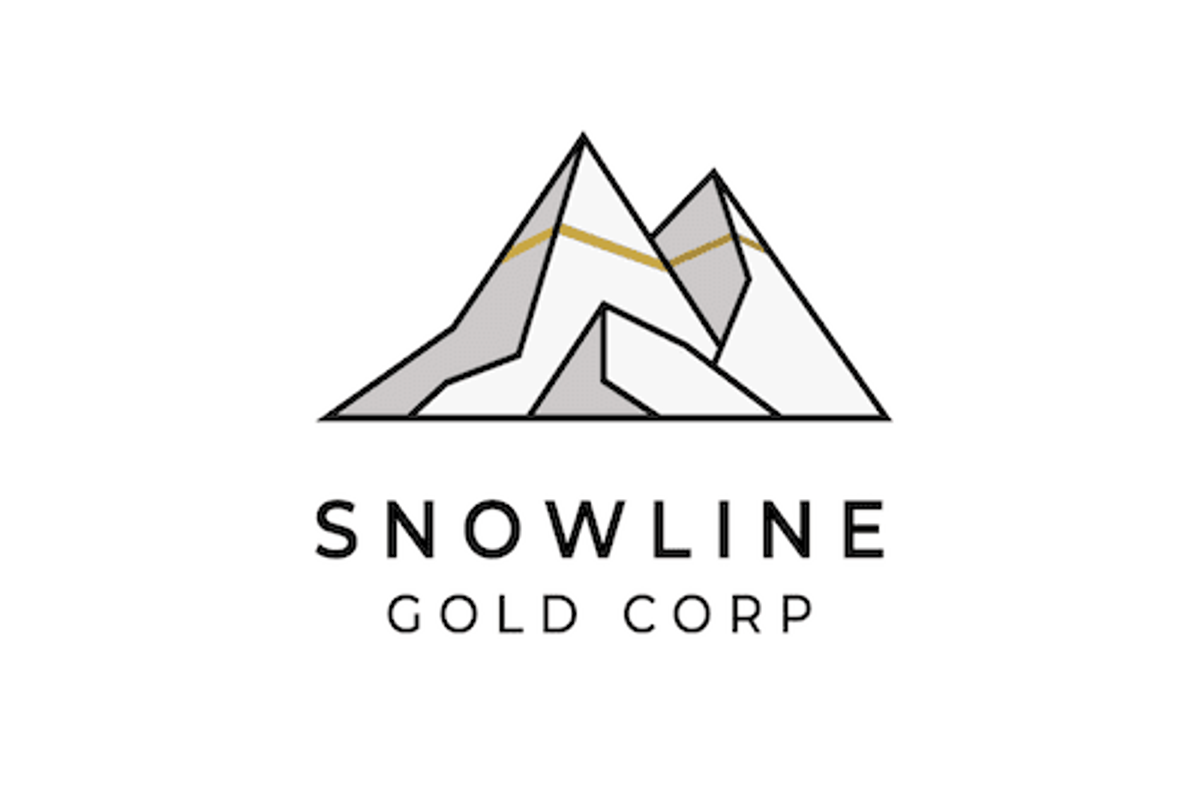
- Sheeted vein mineralization observed across 700 m by 800 m area at Valley, with mineralization open in all directions and wider step-outs planned
- Central corridor of high vein density up to 300 m wide, 600 m long (open) and 430 m deep (open) encountered in holes V-22-005, 007, 010, 012, 014 and 015
- V-22-015 in system for entire 554 m length, with broad zones of high vein density
- All assay results and latest drill core evaluations pending, drilling ongoing.
SNOWLINE GOLD CORP. (CSE:SGD) (OTCQB:SNWGF) (the "Company" or "Snowline") is pleased to announce that it has encountered gold bearing quartz vein mineralization in multiple large step-out holes at its Rogue project's Valley Zone in Canada's Yukon Territory (Figure 1). Characteristic sheeted veins are present at various intensities across the roughly 800 m width of the intrusion and extending into the surrounding hornfelsed rocks, and along 700 m of strike length tested to date. Of note is a corridor of high vein densities (commonly >15 veinsm) up to 300 m wide intersected across 600 m of strike length and open along strike, with robust mineralization intersected at 430 m below surface and open to further depth

Figure 1 - Drilling progress at the Valley Zone, showing quartz vein densities in drill core. Veins range in thickness from several mm to 30 cm true width. Vein densities are considered by the Company a general indicator of gold potential, though other factors can influence grade within and between holes. Assays remain pending for all holes drilled in 2022. A potential southeastern extension of the Valley intrusion is suspected based on aerial magnetic data collected in 2021 and 2022.
"We are very encouraged by the scale of the mineralized system we are seeing at Valley," said Scott Berdahl, CEO & Director of Snowline. "Each successful step-out across hundreds of metres adds significantly to the bulk-tonnage potential of the target, and mineralization is present from surface to the bottoms of the deepest holes we've drilled to date-to 554 m downhole corresponding to 430 m below surface. Of course, we won't know the true significance of the discovery until we have drill core assays back. Lab estimates now point to mid-August for return of our first holes of the 2022 exploration season."

Figure 2 - Schematic cross section across the ~800m width of the Valley intrusion showing quartz vein densities and occurrences of trace visible gold. The mineralized vein sets strike roughly perpendicular to this section (into and out of the page). The highest vein densities and thickest quartz veins are consistent across multiple holes within a central corridor, which remains open along strike and to depth. Vein densities in V-22-013, the least mineralized in terms of overall quartz veining, commonly exceed 5 veins/m. The location of the cross section is shown on Figures 1 and 3, with the view looking northwest.
CENTRAL MINERALIZED CORRIDOR
High quartz vein densities previously reported in holes V-22-005 and V-22-007 appear to form part of a well-mineralized corridor cutting NW-SE through the Valley intrusion. Drilling to date suggests a true width to this zone of up to 300 m where tested. The length of the system is open, and runs roughly 600 m from V-22-005 in the NW to V-22-012 in the southeast. Similarly, mineralization remains open at depth; holes V-22-014 and V-22-015 intersect the zone at surface and to as deep as 430 m below surface, respectively, with moderate to high vein densities continuing to depth (Figure 2). Hole V-22-010 tested the eastern boundary of the corridor, with 120 instances of trace, sub-millimeter scale visible gold observed along the length of the 404 m hole during logging and after cutting (Figure 3).

Figure 3 - Instances of trace visible gold encountered in drilling at Valley. Gold grains are sub-millimeter in scale, often between 10 and 100 microns (0.01 to 0.1 mm) in size, and commonly found in association with bismuthinite and tellurium minerals. While the presence of visible gold demonstrates the presence of gold and is thus an encouraging sign, in such systems its presence does not correlate perfectly with gold grades. It is also somewhat subjective, as the ultimate count can depend on the attention to detail of one core logging geologist versus another.

Figure 4 - Quartz vein mineralization in V-21-015, from 396 to 428 m downhole. The hole is mineralized to varying degrees along its entire 554 m length. From approximately 364 m to 502 m downhole it intersects at depth the same zone of abundant quartz veins encountered in both V-22-007 and V-22-014, with densities commonly above 15 veins/m and locally exceeding 30 veins/m, with individual veins up to 20 cm true thickness. Multiple crosscutting quartz vein generations are present, and trace instances of fine-grained visible gold were observed at points along the length of the hole (Figure 2).
BROADER VALLEY INTRUSION
Holes V-22-013 and V-22-017 continue to build out the overall extent of known mineralization within the Valley intrusion, complementing the low to moderate densities of sheeted vein arrays seen in V-22-006 and in the bottom of V-22-008, and demonstrating the (open) length of the system across roughly 700 m to date. Vein densities in these holes are generally comparable and locally in excess to those encountered in 2021 drilling near the northwest edge of the intrusion, where intercepts of up to 1.25 g/t Au over 168.7 m were encountered. The 2021 holes crosscut both hornfelsed metasedimentary rocks and intrusive rocks. It remains to be seen whether similar vein densities in different host rock types (e.g. entirely in the intrusion) can be expected to carry similar grades within this system.
The local width of the intrusion along the section including V-22-007 and V-22-015 is roughly 800 m, with low to locally moderate (5-15 veins/m) densities of quartz veins continuing into the surrounding hornfelsed metasedimentary rocks. To the southeast, recently collected airborne magnetic data suggests the potential presence of a continuation of the Valley intrusion, or alternatively a smaller secondary stock hidden beneath cover.
In total, roughly 5,200 m of drilling has been completed at Valley in 2022 across 14 holes. Drill holes V-22-009 and V-22-016 were abandoned due to thick downslope talus cover, and steepened to reach bedrock (becoming holes V-22-011 and V-22-017).
Assays for all holes drilled to date in 2022 are pending, and drilling of additional holes at Valley is ongoing. The Company finds these visual results to be encouraging, and it cautions that the significance of the observations reported herein will not be known until assays are received and reviewed. Vein densities are a primary factor in determining grade, but other factors including typical vein thickness, individual vein grades (including presence of visible gold), host rock type and relative location within the hydrothermal fluid system can influence overall gold grade. Valley is an early-stage exploration project without a resource estimate, and the presence or absence of an economically viable orebody cannot be determined until significant additional work is completed.
THREE DRILLS NOW ACTIVE
A third helicopter-portable drill has mobilized to the Valley Zone. The drills and the geological team are working in tandem to continue building out the scale of known mineralization at Valley.
One drill is slated to move to the Gracie Zone, some 4 km east of Valley, where an intrusion thought to be related to Valley is present below surface. Aerial magnetic work and mapping have identified multiple structural corridors, including a sheeted join/vein array in hornfels sediment that parallels a dominant mineralization orientation at the Valley Zone. This Phase I program will be the first-ever drill testing of the Gracie Zone.

Figure 5 - Location of V-22-007 and V-22-012 in the context of the broader Valley-Gracie trend. Surface geochemistry and geophysics (Z-axis Tipper Electromagnetic Survey) data suggest the presence of a potentially similar reduced intrusion related gold system at Gracie. Snowline plans to initiate Phase I drilling at Gracie in August.
ABOUT ROGUE
The geological setting and style of mineralization at Rogue's Valley Zone indicate the presence of a bulk tonnage gold target, with similarities to Kinross's Fort Knox Mine in Alaska and Victoria Gold's Eagle Mine in the Yukon. An 800 m Phase I drill program conducted at Valley in September 2021 encountered broad zones of gold mineralization in all four holes drilled (see Snowline news release dated February 10, 2022). Gold is associated with bismuthinite and telluride minerals hosted in sheeted quartz vein arrays along the margins of a mid-Cretaceous aged Mayo-series intrusion.

Figure 6 - Project location map for Snowline Gold's eastern Selwyn Basin properties. The Valley and Gracie Zones on the Rogue are the sites of current and planned drilling.
ABOUT Snowline Gold Corp.
Snowline Gold Corp. is a Yukon Territory focused gold exploration company with a seven-project portfolio covering >127,000 ha. The Company is exploring its flagship >85,000 ha Einarson and Rogue gold projects in the highly prospective yet underexplored Selwyn Basin. Snowline's project portfolio sits within the prolific Tintina Gold Province, host to multiple million-ounce-plus gold mines and deposits including Kinross' Fort Knox mine, Newmont's Coffee deposit, and Victoria Gold's Eagle Mine. The Company's first-mover land position and extensive database provide a unique opportunity for investors to be part of multiple discoveries and the creation of a new gold district.
QUALIFIED PERSON
Information in this release has been prepared under supervision of and approved by Thomas K. Branson, M.Sc., P. Geo., Exploration Manager for Snowline and a Qualified Person for the purposes of National Instrument 43-101.
ON BEHALF OF THE BOARD
Scott Berdahl
CEO & Director
For further information, please contact:
Snowline Gold Corp.
+1 778 650 5485
info@snowlinegold.com
CAUTIONARY NOTE REGARDING FORWARD-LOOKING STATEMENTS
This news release contains certain forward-looking statements, including statements about the Company's upcoming drill program, implied significance of visual inspection of drill core, outcomes of mineral tenure ownership resolution, and surface work and plans for exploring and expanding a new greenfield, district-scale gold system. Wherever possible, words such as "may", "will", "should", "could", "expect", "plan", "intend", "anticipate", "believe", "estimate", "predict" or "potential" or the negative or other variations of these words, or similar words or phrases, have been used to identify these forward-looking statements. These statements reflect management's current beliefs and are based on information currently available to management as at the date hereof.
Forward-looking statements involve significant risk, uncertainties and assumptions. Many factors could cause actual results, performance or achievements to differ materially from the results discussed or implied in the forward-looking statements. Such factors include, among other things: risks related to uncertainties inherent in drill results and the estimation of mineral resources; and risks associated with executing the Company's plans and intentions. These factors should be considered carefully, and readers should not place undue reliance on the forward-looking statements. Although the forward-looking statements contained in this news release are based upon what management believes to be reasonable assumptions, the Company cannot assure readers that actual results will be consistent with these forward-looking statements. These forward-looking statements are made as of the date of this news release, and the Company assumes no obligation to update or revise them to reflect new events or circumstances, except as required by law.
SOURCE: Snowline Gold Corp.
View source version on accesswire.com:
https://www.accesswire.com/710683/Snowline-Gold-Further-Expands-Mineralized-Footprint-of-Valley-Zone-and-Mobilizes-Third-Drill-to-Its-Rogue-Project-Yukon
